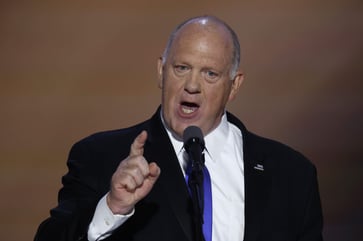The emergence of digital voices and Comcast's split are predicted to bring about the end of traditional media.
In the past year, Comcast's cable networks spinoff brought in $7 billion in earnings.

Comcast's cable networks, including MSNBC and CNBC, generate a substantial amount of revenue.
It doesn’t matter.
The Wall Street Journal reported yesterday that the communications giant confirmed it is spinning off almost all its cable properties, including USA, E!, Oxygen, Syfy, and Golf Channel, which generated $7 billion in revenue in the latest 12-month period.
The NBC television network, Peacock streaming service, Bravo, sports, movies, and theme parks are all staying with the mother ship.

The implication is that all-news channels have a questionable future, as indicated by the financial questions surrounding smaller cable units seeking larger partners.
Cable staffers, including top anchors, are anxious about their uncertain future with CNN facing layoffs and potential deeper cuts under its new leadership.
For years, prognosticators have warned that cable news faces an issue with aging audiences, despite Fox's ratings remaining high. Additionally, this problem is being exacerbated by the rise of new digital media, which is eclipsing both cable news and newspapers.
During the presidential campaign, Donald Trump and Kamala Harris made headlines through their appearances on podcasts and by engaging with social media influencers. These disruptions challenged the dominance of corporate media and provided a space for fresh, unconventional perspectives.
In the Free Press, author and former CIA analyst Martin Gurri argues:
"The news media, as an institution, has taken a significant step towards becoming irrelevant and facing extinction. Despite losing the public's trust, major brands such as the New York Times and CBS News continued to influence public opinion in favor of Democratic candidates and progressive positions."
According to Gurri, the coverage of the election was akin to postjournalism on acid. Initially, Joe Biden was lauded as a wise and experienced leader. However, once he became a political liability, the media turned on him, criticizing him for being too old and frail. This shift in perception was particularly jarring given that the media had previously attacked anyone who questioned Biden's mental acuity.

"The attacks on Trump were so exaggerated and routine that they took on the appearance of parody if not humor. My favorite election story was an article from The Atlantic titled "Trump Is Speaking Like Hitler, Stalin, and Mussolini." Not long after its publication, the three-headed super-totalitarian was found working at a McDonald's in Pennsylvania, cooking French fries."
Rubin, a conservative columnist for The Washington Post, has become a Trump critic and tweeted, "Hitler is in power in 1933."
The fight over the best seats in the house was more intense than the old joke about rearranging the deck chairs on the Titanic, as an entire industry was destroyed.
I must sound the alarm on the excessive rhetoric. Despite the trend to disregard "traditional media," they are not on the brink of extinction or destruction.

Despite their flaws and biases, news organizations have disclosed information about Trump nominees, and the most significant moments of the campaign, including debates and key interviews, have been televised.
Still, the times they are a’changing.
Substack has given journalists and others an independent platform, while Meta's Facebook and Instagram are reducing their focus on political content.
Co-founder Hamish McKenzie stated in an interview with the New York Times that there is a dire requirement for a reliable platform with credible voices, where genuine political discussions, debates, and disagreements can take place without vanishing into thin air or occurring on a platform characterized by constant conflict and hostility.
According to The Times, data guru Nate Silver and The Bulwark, a conservative, anti-Trump site, are among the biggest stars who have earned millions of dollars in subscription revenue. The Bulwark claims to have made about $6 million in annual revenue from Substack, while Silver says he is making more money than at ABC.
Elon Musk attempted to purchase Substack, but the company is not profitable because it only takes a 10% cut of earnings. As a result, Musk temporarily prohibited Substack links on X.
Despite the uncertainty, it serves as a robust foundation for disillusioned or unemployed journalists, as well as newcomers who establish a following through their areas of expertise.
The Comcast move suggests that the media landscape has evolved significantly. However, those who predict the demise of traditional media are misguided; not all Americans are perpetually connected online.
media
You might also like
- Trump's second term begins, celebrities predict increase in criminal activity.
- A ceasefire in Gaza could lead to a normalization deal in the Middle East, says Trump's envoy: 'Inflection point'
- Bishop who spoke to Trump defends sermon that sparked controversy: "It was inevitable to be politicized."
- Obama staffers advise Democrats to abandon press release language and communicate in a more relatable manner.
- Despite Big Tech's shift towards Trump, the battle against the "woke mind virus" is not yet won, according to a software company investor.



















